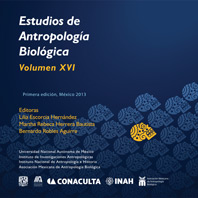The ontogenic selection in human evolution
DOI:
https://doi.org/10.22201/iia.14055066p.2013.56707Keywords:
ontogenetic selection, human evolution, bioculturalAbstract
Selection is a major evolutionary process that includes a variety of phenomena. A classification of the types of selection was proposed by Catina (2001), who divides them into natural selection, ontogenetic selection, and cultural selection. The first is widely sought by evolutionary biology and the third is extremely useful for anthropology. In both cases is recognized its fundamental importance in human evolution. However, it is essential to know the relationship between each other. Here is discussed the link established by ontogenetic selection between those two types of selection and suggested a human evolutionary perspective focused on ontogene-tic selection, by explaining the role it may have played in the development of the most important characters in the evolution of our lineage, as are the bipedal posture, brain development, including culture and language. Exposing the importance of ontogenetic selection leads us to argue that it is the causal process and the result of evolution characterized as biocultural of our species.
Downloads
Downloads
Published
How to Cite
Issue
Section
License

http://creativecommons.org/licenses/by-nc-nd/4.0/


